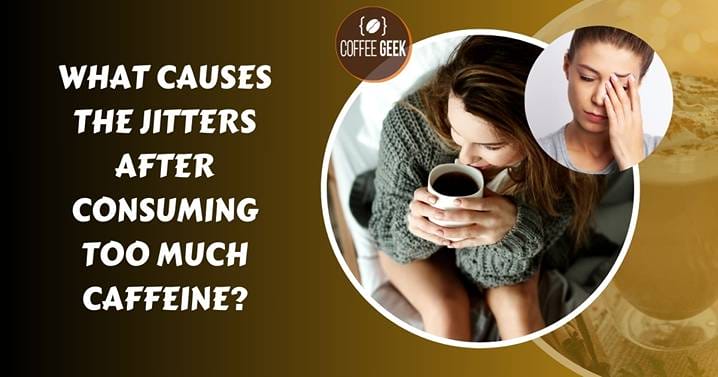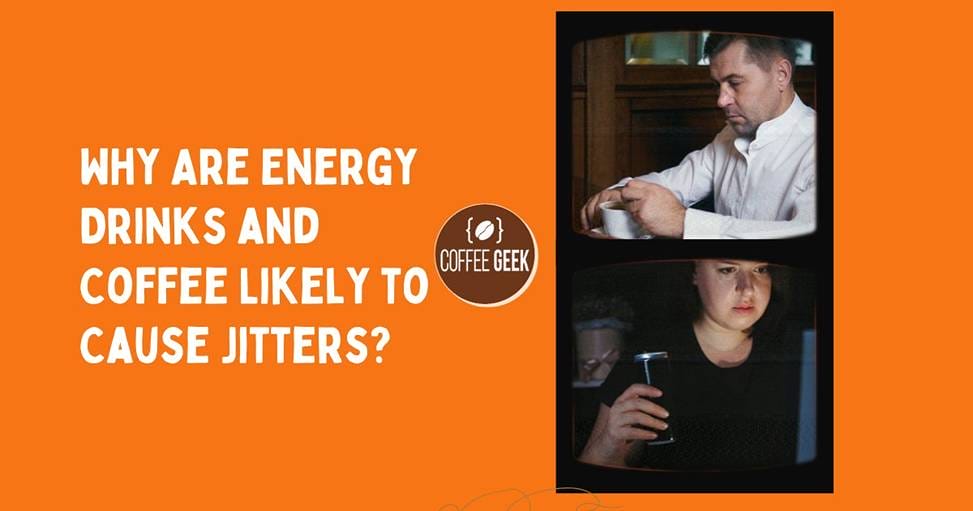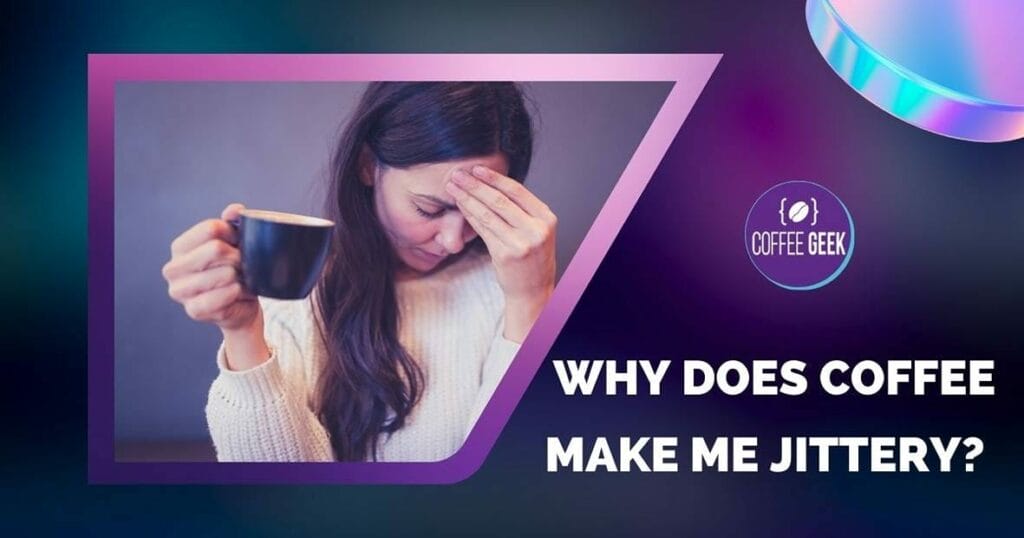It’s a challenge faced by coffee drinkers around the globe: that jittery, shaky feeling you get when you consume too much caffeine.
This article explores the why and how of caffeine jitters, along with offering ways to get rid, and even prevent them.
Strap yourself in, we’re about to embark on a deep dive into the world of caffeine. Why does coffee make me jittery?
What Causes the Jitters After Consuming Too Much Caffeine?
Caffeine-caused jitters are common side effects of too much caffeine. But what causes them? Let’s find out by examining the stimulant caffeine effects.

How Does the Stimulant Effect of Caffeine Impact the Nervous System?
Caffeine is a stimulant and affects the entire nervous system. Drinking too much coffee can overstimulate the system, leading to coffee jitters and an increased heart rate.
Is there a Link between Caffeine Intake and Increased Heart rate?
The most common physical reaction caused by too much caffeine intake, indeed, is an increase in heart rate, which often causes jitters and a jittery feeling.
Why Are Energy Drinks and Coffee Likely to Cause Jitters?

Both energy drinks and coffee have a high level of caffeine content. Consuming these in excess can lead to coffee jitters, making you feel shaky and jittery.
How Can I Get Rid of the Coffee Jitters?
Are you already experiencing coffee jitters and wondering how to handle them? Don’t fret! Here are some useful strategies to consider.
Why Does Coffee Make Me Jittery?
Limiting your caffeine intake is the most direct way to avoid the jittery side caffeine effects. But how you drink coffee matters too, for instance, avoid drinking coffee on an empty stomach as it increases the jittery feeling.

How Can Decaf Coffee Help in Getting Rid of the Coffee Jitters?
Decaf coffee contains less caffeine compared to your regular coffee. Switching to decaf might be a smart move if your goal is to get rid of coffee jitters.
What Role Does Metabolizing Caffeine Play in Reducing Jitters?
Metabolizing caffeine efficiently can help reduce its stimulant effects, which in turn helps to get rid of the jittery feeling.
Understanding How Much Caffeine is in a Cup of Coffee
Now, you might be wondering, “Just how much caffeine is there in a regular cup of coffee?” Allow us to enlighten you.
What Determines the Amount of Caffeine in Different Coffee Beans?
The amount of caffeine varies between different coffee beans, with factors such as the type and roast of the bean influencing the caffeine content.

How Does Coffee Compare to Other Drinks in Terms of Caffeine Content?
When it comes to caffeine content, coffee is head and shoulders above most other drinks.
How Much Coffee Consumption can be considered as Consuming Too Much Caffeine?
General guidelines suggest limiting caffeine consumption to no more than 400mg per day, equivalent to about four cups of regular coffee.
What Are the Other Caffeine Effects Aside from Jitters?
Now that we’ve looked into the jitters cause caffeine, let’s broaden our spectrum and interrogate the other caffeine effects.
Can Consumption of Coffee on an Empty Stomach Increase the Jittery Feeling?
Indeed, drinking coffee on empty stomach can worsen the jittery feeling, as it fast-tracks the caffeine’s journey to your nervous system.

What Are the Common Physical Reactions such as Shakiness due to High Caffeine Intake?
Beyond just jitters, high caffeine intake can cause other physical reactions, such as stomach upset, increased urination, and sleep issues, amongst others.
What Are Some Long-term Implications of Excessive Caffeine Consumption?
Long-term implications of excessive caffeine consumption include dependency, exacerbation of mental health conditions, and poor sleep quality, amongst others.
How Long Do Caffeine-Caused Jitters Last and Ways to Prevent Them
Understanding the duration and the prevention of jitters is just as important as knowing what causes them. Let’s look into these aspects.
What Factors Determine How Long the Jitters Last After Drinking Coffee?
The duration of jitters is mostly impacted by factors like individuals metabolism and the amount of caffeine intake.
What Ways to Get Rid of the Coffee Jitters are Most Effective?

Regular exercise, balanced diet, and sufficient hydration are some of the most effective ways to get rid of the jitters caused by too much caffeine.
What Precautions Can Be Taken to Avoid the Jitters Caused by Caffeine?
Limiting caffeine intake, avoiding drinking coffee on an empty stomach, and opting for decaf are effective precautions to take to avoid caffeine jitters.
Considering half of the caffeine in your coffee remains in your system for several hours after you drink it, it’s necessary to plan your coffee intake accordingly.
| Possible Reasons for Jitters after Coffee Consumption | Explanation |
|---|---|
| Caffeine Content | Coffee contains caffeine, a stimulant that can lead to increased heart rate and alertness. High doses may cause jitteriness. |
| Individual Sensitivity | People vary in their sensitivity to caffeine. Some individuals may be more prone to jitteriness even with small amounts of coffee. |
| Adrenaline Release | Caffeine stimulates the release of adrenaline, the “fight or flight” hormone, contributing to heightened alertness and potential jitteriness. |
| Blood Sugar Fluctuations | Coffee can affect blood sugar levels, leading to fluctuations. Low blood sugar (hypoglycemia) may contribute to jitteriness. |
| Dehydration | Caffeine is a diuretic, causing increased urine production. Dehydration can lead to feelings of jitteriness and restlessness. |
| Lack of Sleep | Coffee is often consumed to combat fatigue. However, excessive caffeine intake without sufficient rest can result in jitteriness. |
| Anxiety and Stress | Caffeine can exacerbate anxiety symptoms. Individuals prone to stress or anxiety may experience heightened jitteriness after coffee. |
| Medication Interactions | Some medications can interact with caffeine, intensifying its effects and potentially causing jitteriness. Check for drug interactions. |
| Coffee Quality and Brewing Methods | The type of coffee bean, brewing method, and overall coffee quality can influence its impact on the body, including jitteriness. |
| Dietary Factors | Individual diet and nutritional factors can play a role. An empty stomach or nutrient deficiencies may contribute to jitteriness. |
Conclusion
Understanding why coffee makes some people jittery is primarily linked to how caffeine, caffeine is the main stimulant in coffee, affects the body.
Caffeine is known to have several health benefits, but like any stimulant, caffeine can cause certain adverse reactions such as jitters and feelings of anxiety, especially when consumed in large amounts.
The jitters may occur because caffeine triggers the body’s “fight or flight” response.
This can lead to symptoms like a rapid heart rate and feelings of anxiety – the same physiological changes that occur in response to danger or stress.
Essentially, caffeine gives your body a burst of energy, but it can also make you feel anxious or jittery, particularly if you’re sensitive to caffeine or if you’ve had a bit too much.
It’s important to keep in mind that individual tolerance to caffeine varies.
For some, even a single cup may induce jitters, while others can consume much more without any adverse effects.
Health experts often cite that up to 400 milligrams of caffeine per day – roughly the amount in four average-sized cups of coffee – is considered safe for most adults.
However, surpassing this limit can make your coffee jitters more likely.
To mitigate the effects of jitters, it’s helpful to understand your own caffeine limits.
One way to manage jitters is to drink less coffee or choose beverages with lower caffeine content.
It may sound obvious, but reducing the amount of caffeine can significantly decrease the chance of experiencing jitters.
Another tip to manage coffee jitters is to ensure adequate hydration and nutrition.
Caffeine can also have a diuretic effect, so drinking water alongside coffee can help.
Including food in your diet that balances the stimulant effect of caffeine can also be beneficial.
In summary, while caffeine offers various health benefits, it’s the primary culprit behind the jittery feeling some experience after drinking coffee.
The key to enjoying coffee without the jitters is moderation and understanding your body’s response to caffeine.
Remember, an ounce of prevention in monitoring caffeine intake is worth a pound of cure in managing and mitigating the effects.
FAQ
Why does drinking caffeine cause me to feel jittery?
Caffeine can make stimulation to your nervous system, which can lead to a feeling of nervous energy or jitters.
Also, the effects of your coffee can vary from person to person depending on factors like your caffeine tolerance and the dose of caffeine in your cup of coffee.
How much caffeine is too much per day?
Health authorities recommend an intake of caffeine not exceeding 400 milligrams per day for most healthy adults. Consuming caffeine beyond this level can lead to unwanted side effects like the jitters.
How can I get rid of coffee jitters caused by consuming too much caffeine?
Staying hydrated, eating protein-rich foods, getting plenty of rest, and reducing caffeine intake can help to reduce coffee jitters. You may also want to try switching to a drink with less caffeine, such as green tea.
Are there other drinks that make me jittery other than coffee?
A: Yes. Other drinks with high caffeine levels such as espresso and soda can also cause jitters. Keep in mind that caffeine effects vary from person to person, hence some caffeine lovers may not feel the effects as much.
Why do I feel the effects of my coffee more some days than others?
Factors like your sleep levels, how much you’ve eaten, and whether you’re under stress can alter the way your body reacts to caffeine.
Furthermore, people who don’t drink caffeine regularly may experience stronger effects when they do have it.
Why does caffeine cause a “fight or flight” response?
Caffeine is a central nervous system stimulant. It triggers the release of adrenaline, the “fight or flight” hormone, which can increase heart rate, prompt anxiety, and cause jitters.
What are some ways to avoid the unwanted side effects of caffeine?
Some ways to keep the jitters at bay include monitoring your caffeine intake, drinking it in moderation, staying hydrated, and maintaining a balanced diet.
Understanding how much is too much for you might also help to prevent the unwanted side effects.
Can caffeine withdrawal cause jitters?
Yes, caffeine withdrawal symptoms can include jitters, headache, irritability and fatigue. These symptoms can begin around 12 to 24 hours after stopping caffeine intake and can last for up to a week.
Can decaffeinated coffee cause jitters?
Decaffeinated coffee might still contain some caffeine, but not enough to cause jitters in most people.
However, if one is extremely sensitive to caffeine, even the small amount in decaf coffee might cause jitters.
How can I reduce caffeine’s jittery effects without completely giving it up?
Gradually reducing your caffeine intake can help minimize withdrawal symptoms and jitters. You can also try drinking lower-caffeine beverages like green tea or opting for half-caff or decaf options.

